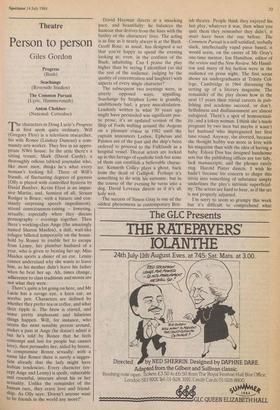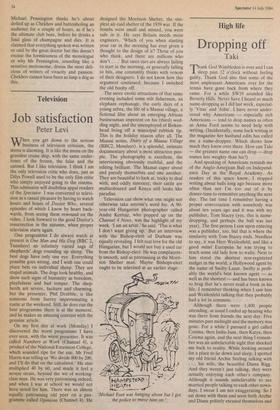Theatre
Person to person
Giles Gordon
Progress (Bush)
Seachange (Riverside Studios) The Common Pursuit (Lyric, Hammersmith) Anton Chekhov (National: Cottesloe)
he characters in Doug Lucie's Progress
at first seem quite ordinary. Will (Gregory Floy) is a television researcher, his wife Ronee (Lindsay Duncan) a com- munity arts worker. They live in an appro- priate NW6 house. In the attic there's a sitting tenant, Mark (David Cardy), a thoroughly odious tabloid journalist who, like most men, thinks he's what every woman's looking for. Three of Will's friends, of fluctuating degrees of gayness (Oily is played with controlled hysteria by David Bamber, Kevin Elyot is an impas- sive Martin, and, funniest of all, Struan Rodger is Bruce, with a bizarre and con- stantly surprising speech impediment), attend consciousness-raising — lowering, actually; especially when they discuss pornography — evenings together. Then there's working-class Ange (the amazingly named Sharon Maiden), a dull, waif-like refugee billeted temporarily on the house- hold by Ronee to enable her to escape from Lenny, her plumber husband of a year, who is given to beating her up: Miss Maiden sports a shiner of an eye. Lenny. cannot understand why she wants to leave. him, as his mother didn't leave his father when he beat her up. Ah, times change, adherence to class traditions and mores are not what they were.
There's quite a lot going on here, and Mr Lucie has a savage eye, a keen ear, an acerbic pen. Characters are defined by whether they prefer tea or coffee, and what their tipple is. The brew is stirred, and some pretty unpleasant and hilarious things happen. Will, for instance, who seems the most sensible person around, makes a pass at Ange (he doesn't admit it but he's told by Ronee that he feels contempt and lust for people but cannot love), then persuades her, aided by booze, to compromise Ronee sexually: with a name like Ronee there is surely a sugges- tion already that the lady might have lesbian tendencies. Every character (ex- cept Ange and Lenny) is spoilt, vulnerable and resentful, insecure about his or her sexuality. Unlike the remainder of the human race, they crave love and friend- ship. As Oily says: `Doesn't anyone want to be friends in the world any more?'
David Hayman directs at a smacking pace, and beautifully: he balances the humour that derives from the lines with the futility of the characters' lives. The acting is as fine as it nearly always is at the Bush. Geoff Rose, as usual, has designed a set that you're happy to spend the evening looking at; even, in the confines of the Bush, inhabiting. Can I praise the play higher than by saying I identified (so did the rest of the audience, judging by the quality of concentration and laughter) with aspects of every single character?
The subsequent two evenings were, in utterly opposed ways, appalling. Seachange by Stephen Lowe is grandly, amibitiously bad, a grave miscalculation. Leadenly written in what 30 years ago might have persuaded was significant poe- tic prose, it's an updated version of the Ship of Fools wafting around the Aegean on a pleasure cruise in 1982 until the captain announces Lesbos, Ephesus and Patmos are of the past and the ship's been ordered to proceed to the Falklands as a hospital vessel. Decent actors are locked up in this farrago of symbolic tosh but none of them can establish a believable charac- ter. Kenneth Colley plays a ghost, back from the dead of Gallipoli. Perhaps it's something to do with his surname, but in the course of the evening he turns into a dog. David Leveaux directs as if it's all holy writ.
The success of Simon Gray is one of the oddest phenomena in contemporary Brit- ish theatre. People think they enjoyed his last play,' whatever it was, then when you quiz them they remember they didn't, it must have been the one before. The Common Pursuit is a self-satisfied, verbally slack, intellectually vapid piece based, it would seem, on the career of Mr Gray's one-time mentor, Ian Hamilton, editor of the review and the New Review. Mr Hamil- ton and many of his faction were in the audience on press night. The first scene shows six undergraduates at Trinity Col- lege, Cambridge in 1964 discussing the setting up of a literary magazine. The remainder of the play shows how in the next 15 years their trivial careers in pub- lishing and academe succeed, or don't. Selfishness and disillusionment are almost eulogised. There's a spot of homosexual- ity, and a token woman. I think she's made pregnant by two men but maybe it wasn't her husband who impregnated her first time round. Anyway, she aborted, because she thought hubby was more in love with his magazine than with the idea of having a baby. Eileen Diss has designed handsome sets but the publishing offices are too tidy, lack manuscripts, and the phones rarely ring. Harold Pinter directs. I wish he hadn't because his concern to shape this trivia into something of substance simply underlines the play's intrinsic superficial- ity. The actors are hard to hear, as if the set is not properly adjusted.
I'm sorry to seem so grumpy this week but it's difficult to comprehend what
Michael Pennington thinks he's about dolled up as Chekhov and buttonholing an audience for a couple of hours, as if he's the ultimate club bore, before he drinks a final glass of champagne and dies. It is claimed that everything spoken was written or said by the great doctor but this doesn't excuse the formlessness of the monologue or why Mr Pennington, sounding like a sensitive metronome, drains the most deli- cious of writers of vivacity and passion. Chekhov cannot have been as limp a dog as this.















































 Previous page
Previous page